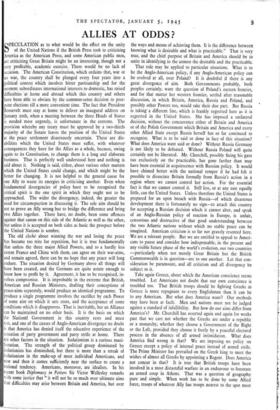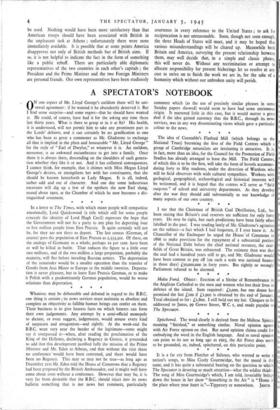ALLIES AT ODDS ?
SPECULATION as to what would be the effect on the unity of the United Nations if the British Press took to criticising America as the American Press, and some American public men, are criticising Great Britain might be an interesting, though not a very profitable, academic exercise. There would be no lack of occasion. The American Constitution, which ordains that, war or no war, the country shall be plunged every four years into a political contest which involves bitter partisanship and for the moment subordinates international interests to domestic, has raised difficulties 'at home and abroad which this country and others have been able to obviate by the common-sense decision to post- pone elections till a more convenient time. The fact that President Roosevelt must stay at home to deliver an inaugural address on January zoth, when a meeting between the three Heads of States is needed most urgently, is unfortunate in the extreme. The provision whereby any treaty must be approved by a two-thirds majority of the Senate leaves the position of the United States at the peace settlement disastrously uncertain. These are dis- abilities which the United States must suffer, with whatever consequences they have for the Allies as a whole, because, owing again to its Constitution, to change them is a long and elaborate business. That is perfectly well understood here and nothing is said about it. Nothing is said, either, about various other matters which the United States could change, and which might be the better for changing. It is not helpful to the general cause fot one Ally to waste its energies in criticising another. Even when fundamental divergencies of policy have to be recognised the critical spirit is the one spirit in which they ought not to be approached. The wider the divergency, indeed, the greater the need for circumspection in discussing it. The sole aim should be not to prove an Ally wrong but to bridge the difference and bring two Allies together. There have, no doubt, been some offences against that canon on this side of the Atlantic as well as the other, but unless it is accepted on both sides as basic the prospect before the United Nations is sombre.
The old cliché about winning the war and losing the peace has become too trite for repetition, but it is true fundamentally that unless the three major Allied Powers, and to a hardly less extent France and China with them, can agree on their war-aims, and remain agreed, there can be no hope that any peace will long endure. The situation desired by Germany above all things will have been created, and the Germans are quite astute enough to know how to profit by it. Agreement, it has to be recognised, in- volves compromise. It is improbable in the extreme that British, American and Russian Ministers, drafting their conceptions of peace-aims separately, would produce an identical programme. To produce a single programme involves the sacrifice by each Power of some aim- on which it sets store, and the acceptance of some conditions which it disapproves. That is inevitable, but an Alliance can be maintained on no other basis. It is the basis on which the National Government in this country rests and must rest, and one of the causes of Anglo-American divergence no doubt is that America has denied itself the educative experience of the cessation of party government and party strife at home. There are other factors in the situation. Isolationism is a curious mani- festation. The strength of the political group dominated by isolationists has diminished, but there is more than a streak of isolationism in the make-up of most individual Americans, and now and then it comes sufficiently near the surface to create a national tendency. Americans, moreover, are idealists. In his ecent book Diplomacy in Fetters Sir Victor Wellesley remarks with some justice that " it will not be so much over ultimate aims that difficulties may arise between Britain and America, but over the ways and means of achieving them. It is the difference between knowing what is desirable and what is practicable." That is very true, and the chief purpose of Britain and America should be to unite in identifying to the utmost the desirable and the practicable.
That rule may be applied to particular situations. What is to be the Anglo-American policy, if any Anglo-American policy can be evolved at all, over Poland? It is doubtful if there is any great divergence of aim. Both Governments probably, both peoples certainly, want the question of Poland's eastern frontier, and for that matter her western frontier, settled after reasonable discussion, in which Britain, America, Russia and Poland, and possibly other Powers too, would take their due part. But Russia is taking' a different line, which is frankly regretted here as it is regretted in the United States. She has imposed a unilateral decision, without the concurrence either of Britain and America or of. the Polish Government which Britain and America and every other Allied State except Russia herself has so far continued to recognise. What is to be said or done in face of this situation? What does America want said or done? Without Russia Germany is not likely to be defeated. Without Russia Poland will quite certainly not be liberated. Mr. Churchill, possibly fixing his gaze too exclusively on the practicable, has gone farther than may have been essential in acquiescence with Russian policy. It would have chimed better with the national temper if he had felt it possible to dissociate Britain formally from Russia's action in a region where we cannot control her action. For the essential fact is that we cannot control it. Still less, or at any rate equally little, can the United States. Unless therefore the United States is prepared for an open breach with Russia—of which disastrous development there is fortunately no sign—to attack this country for accepting a Russian decision which it cannot alter, and speak of an Anglo-Russian policy of reaction in Europe, is unfair, censorious and destructive of that good understanding between the two Atlantic nations without which no stable peace can be imagined. American criticism is so far not gravely resented here. We are a tolerant people. But we are entitled to appeal to Ameri- cans to pause and consider how indispensable, in the present and any visible future phase of the world's evolution, our two countries —particularly when not merely Great Britain but the British Commonwealth is in question—are to one another. Let that con- sideration be paramount, and all criticism and all divergency be subject to it.
Take again Greece, about which the American conscience seems troubled. Let Americans not doubt that our own conscience is troubled too. That British troops should be fighting Greeks in Greece is more repugnant to every Englishman than it can be to any American. But what does America want? Our methods may have been at fault. Men and nations must not be judged against a standard of infallibility. But how do our aims differ from America's? Mr. Churchill has asserted again and again for weeks past that we care not whether the Greeks are under a republic or 'a monarchy, whether they choose a Government of the Right or the Left, provided they choose it freely by a peaceful electoral process in the absence of all armed intimidation. What does America find wrong in that? We are imposing no policy on Greece except a policy of internal peace instead of armed strife. The Prime Minister has prevailed on the Greek king to meet the wishes of almost all Greeks by appointing a Regent. Does America not concur in that? It is true that British troops have been involved in a most distasteful warfare in an endeavour to frustrate an armed coup in Athens. That was a question of geography pure and simple. When work has to be done by some Allied force, troops of whatever Ally has troops nearest to the spot must be used. Nothing would have been more satisfactory than that American troops should have been associated with British in the unpleasant task at Athens ; unfortunately there were none immediately available. It is possible that at some points America disapproves not only of British methods but of British aims. If so, it is not helpful to indicate the fact in the form of something like a public rebuff. There are paiticularly able diplomatic representatives of the two countries in each other's capitals ; the President and the Prime Minister and the two Foreign Ministers are personal friends. Our own representatives have been studiou.sly courteous in every reference to the United States ; to ask for reciprocation is not unreasonable. Soon, though not soon enough, the three Heads of States will meet, and it may be hoped that various misunderstandings will be cleared up. Meanwhile both Britain and America, surveying the present relationship between them, may well decide that, in a simple and classic phrase, this will never do. Without any recrimination or attempt to allocate responsibility for present bickerings let us resolve at any cost to strive on to finish the work we are in, for the sake of a humanity which without our unbroken unity will perish. -



























 Previous page
Previous page